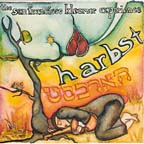Klez-X / Harbst

Klez-X
Harbst
Krywanoga Productions, 2004
Web: www.klezx.com
E-mail Klez-X
They used to be known as the San Francisco Klezmer Experience: a brassy, energetic Bay Area reincarnation of the spirit of the Klezmer Revival pioneers, the Klezmorim.
Years later, they've shortened the name to something appropriately cryptic. The music is astonishingly diverse, a fusion of klezmer, Yiddish folk song, liturgical soul, Yiddish art song, and jazz: a West Coast Flying Bulgars, but different. Put this CD on the changer and listen to the opening "Klezville" with its jazz and scat. Or consider their version of "Shma koleynu" from the Yom Kippur service, here titled "Oy Tate" (Oh Daddy, hear our voice). This isn't your klezmer experience of yore.
Like newer bands klezmer-based bands such as Khevre or Shtreiml, Klez-X features excellent musicians. I never thought of the San Francisco Klezmer Experience as "tight" (that being one reason I always considered them a reincarnation of the Klezmorim). This band is tight. Violinist Daniel Hoffman is well known as both a klezmer and as 1/3 of the new Jewish ensemble, Davka. Jeanette Lewicki has been turning heads for years with her Yiddish singing, as well as with her accordion playing. Stephen Saxon's horn and voice have never sounded better. Sheldon Brown's clarinet and saxes are wonderful. The whole ensemble sounds damn good.
It isn't just that the band is playing tighter than ever before. The diversity is also stunning. Of course they do Yiddish without compare. Lewicki's "Harbst" or "In torbe funem vint" take Yiddish poetry and folk to art song. Listen to her read the English translation to Moyshe-Leyb Halpern's "The Street Drummer" to a hipster backdrop, then, as the drums get faster and more insistent, she sings the song in wonderful Yiddish a la Molly Picon. (Molly get's hers with a dynamite "Oy, s'iz git".) The band hasn't forgotten how to play Klezmer, either, as displayed on a new piece by Daniel Hoffman, "a horkisher nign" or on Hoffman's breakneck violin bringing "Al's Dances" to a close. But how do you characterize Saxon's take on traditional nusakh, as applied to Genesis in "Our Father's Children" which uses Ashkenazi nusakh for verses on Abraham, then twists to the Middle East to sing about Ishmael, and on to a klezmerized show singing for Isaac?
This is one of the most inventive, exciting, tight new Jewish music albums I've heard. The rest is commentary. Get your copy now.
Personnel this recording:
Sheldon Brown: clarinet, alto & soprano saxophones
Daniel Hoffman: violin
Jeanette Lewicki: Yiddish vocals, accordion
Kevin Mummey: drum kit, dumbeq
Richard Saunders: bass
Stephen Saxon: trumpets, alto horn, Hebrew & scat vocals
Charlie Seavey: trombone
Featuring
Stuart Brotman: tsimbl ("in torbe funem vint")
Songs
- Klezville (D. Hoffman) 5:34
- Accordion farshpil (J. Lewicki) 1:30
- Harbst (Music: D. Hoffman; Poetry: Itsik Manger) 5:19
- Oy tate (trad., arr. D. Hoffman) 5:25
- Hulye kabstn (trad., lyrics after Aaron Lebedeff; arr. J. Lewicki) 3:34
- Der gasnpoyker (Music: D. Hoffman, Poetry: Moyshe-Leyb Halpern) 7:14
- A horkisher nign (D. Hoffman) 6:01
- Our father's children (Music: S. Saxon; Text: Genesis) 6:48
- In torbe funem vint (Music: D. Hoffman; Poetry: Abraham Sutzkever) 4:16
- Schwartz doina (Abe Schwartz) 1:43
- Al's dances (D. Hoffman) 2:42
- Oy s'iz git (Music: Jacobs/Ellstein; Lyrics: Molly Picon) 3:00
- Yom-pom-pom (after Molly Picon) 3:52

